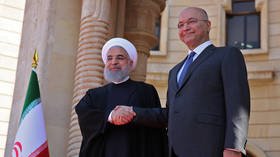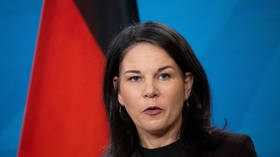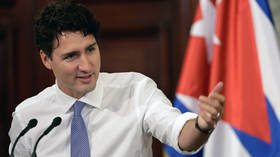Rouhani’s visit to Iraq is a slap in the face to Trump

While the US has had a strategy to contain and isolate Iran, Iran continues to seek and build friendships with its regional neighbors. There are many indications that the US will not tolerate this for much longer.
As an aspiring journalist, it is hard to keep up with which country is at the top of Donald Trump’s “to-bomb” list, given the target appears to change every week or so. Since the infamous days of his campaign trail up until the present day, the US president has held a deep animosity towards Tehran. However, the government’s focus appears to shift away from the Islamic Republic periodically – one minute it’s North Korea, every April since his election he also decides he briefly wants to bomb Assad in Syria, and most recently, his entire administration has raved incessantly about Venezuela.
No matter how the news cycle goes, and no matter the sort of historical death-squad arming psychopath Trump appoints as Special Envoy to Venezuela, at the end of the day the media focus inevitably continues to fall back on Iran (and with it, Donald Trump’s keen and hawkish eye).
This week, Iranian President Hassan Rouhani made his first official visit to Baghdad, a monumental occasion given the two countries fought a brutal and deadly war only a few decades ago. A war which, by the way, the United States saw fit to supply arms to on both sides in order to maximise the death toll (apparently, 1 million dead wasn’t enough).
Also on rt.com Iran in economic, psychological war with US & its allies – President RouhaniThe unofficial irony of the situation is that Iran and Iraq would never be in a position which sees them strengthening their ties to the level we are seeing today if the US had not invaded Iraq and removed Saddam Hussein from power. The idea that the US-led Anglo-alliance could oust the most anti-Iranian Iraqi president of all time and replace him with an even more anti-Iranian president sympathetic to western interests quickly backfired when a Shia government was put in place that quickly aligned its interests with that of Tehran.
Take, for example, the recent announcement that Donald Trump wanted to maintain a strong military presence in Iraq so that he can keep a close eye on Iran. Such a statement was vehemently rejected by Iraq’s leadership, with Iraqi President Barham Salih warning Trump not to “overburden Iraq with your own issues.”
“The US is a major power,” he added, “but do not pursue your own policy priorities. We live here.”
Such a misuse of the 2008 US-Iraq Strategic Framework Agreement, which Washington conceded would not allow the military to use Iraq as a “launching or transit point for attacks against other countries” is “unacceptable,” according to Salih.
READ MORE: Trump did not ask permission to ‘watch Iran’ from bases in Iraq – President Salih
In this context, Rouhani’s visit to Iraq is almost like a slap in the face to the US president. You see, Donald Trump snuck into Iraq in December last year to make a surprise visit to US troops stationed there. Bemused by such a move, Rouhani quipped at the time that Trump’s flight into Iraq during the cover of night-time was a “defeat” for the US in Iraq, querying why on earth Trump did not make an “open and official visit.”
“You have to walk in the streets of Baghdad … to find out how people will welcome you,” Rouhani ridiculed last year.
Photos of Rouhani being welcomed in Baghdad with parades, as well as, for example, photographs of him walking down an alleyway to visit Grand Ayatollah Ali al-Sistani are currently doing the rounds on social media. Rouhani either has one heck of a PR team, or perhaps he had a pretty accurate point.
Pic of Rouhani in alleyway to visit Sistani. It should be a lesson for all regional leaders that one of the most powerful single individuals in Iraq does not work inside a palace. pic.twitter.com/gng1oMtXBd
— Arash Karami (@thekarami) March 13, 2019
During the first day of his visit, the Iranians got to work and signed into agreement documents focusing on trade cooperation, healthcare, energy, consular affairs and even a railway line that would link Iran’s southwest with Iraq’s oil-rich Basra. Iraq’s Foreign Minister Mohammad Ali al-Hakim confirmed in a press conference that the delegations discussed a series of memorandums which also included oil and gas, agriculture, industry and the central bank. The two nations also agreed to reignite their obligations under the Algiers Accords, a document which could prevent future conflict between the two nations.
Further, the two countries also discussed the Syrian war and Syria’s potential inclusion into the Arab League. Unlike most of the players in the region, Iran and Iraq actually share common interest in Syria, particularly with regard to defeating terror groups such as Islamic State (IS, formerly ISIS) and Al-Qaeda.
According to the Associated Press, Iran’s exports to Iraq last year came to almost $9 billion, with a vision to increase the volume in trade between the two neighbours to $20 billion. The idea that Baghdad can be manipulated into becoming a launch-pad, spy-pad or play any role in the destruction of the Iranian state is completely naive and is contrary to all of the available evidence at hand. The US would do well to learn this fact.
But learning this fact is something the current administration refuses to do. With the appointment of notorious anti-Iran war hawks Mike Pompeo and John Bolton, Donald Trump has set up his own miniature axis of evil which is hellbent on bringing Iran to ruins. As brilliantly summarised by Bob Dreyfuss:
“Yet by openly calling for the toppling of the government in Tehran, by withdrawing from the Iran nuclear agreement and reimposing onerous sanctions to cripple that country’s economy, by encouraging Iranians to rise up in revolt, by overtly supporting various exile groups (and perhaps covertly even terrorists), and by joining with Israel and Saudi Arabia in an informal anti-Iranian alliance, the three of them are clearly attempting to force the collapse of the Iranian regime, which just celebrated the 40th anniversary of the 1979 Islamic revolution.”
Also on rt.com Trump & Bolton's slam of Iran revolution highlights 40 years of US ‘regime change’ failureNear the end of last year, the Wall Street Journal (WSJ) famously reported that John Bolton had actually asked the Pentagon to prepare for strikes against Tehran. These were supposedly “retaliatory” in nature, even though it is unclear what actions exactly can be attributed to the Iranian government, particularly with regard to events that take place in Iraq that supposedly threaten US interests.
If the US doesn’t want to get in harm’s way in Iraq, the simple solution would be for them to pack their bags and go home.
In light of this development, some of us are wondering if the plans for retaliatory strikes against Iran already exist. Perhaps it is just sheer fortitude, combined with heavy restraint on the part of Iran, that these plans are yet to be activated. Let’s not forget that rumors have existed of military strike plans against some of Trump’s most well-known adversaries, including and especially North Korea’s Kim Jong-un (who actually does possess nuclear weapons). Why should Iran be any different?
As Dreyfuss explains, there are three main areas in which the US and Iran could clash militarily. Iraq is the obvious example, as outlined already, but as I have written about many times, Trump’s fastest way to Iran may in fact be through Lebanon (as well as Syria, which is already a tried and failed strategy). The other way in which the US can confront Iran directly would be through the Persian Gulf, an area in which Trump once asked, “Why don’t we sink them?” in reference to Iranian ships.
Also on rt.com Trump’s fastest way to Iran might be through LebanonThat being said, the Trump administration is by no means limited to using only these modes of force. As of right now, Saudi Arabia is currently putting together an anti-Iran inspired Arab NATO, and is even in the process of clawing in Pakistan, one of the region’s most integral and underestimated militaries.
As it transpires, the US is currently still discussing with Saudi Arabia a possible deal to sell its civil nuclear technology, as part of a strategy to boost US exports. If the Kingdom of Saudi Arabia even so much as smiles at the idea of acquiring the bomb, you can bet that Iran will act pretty damn fast in countering the potential threat from its regional adversary.
And just so we are clear: the country that exports Wahhabism like a commodity and helped create Al-Qaeda, Islamic State, and almost every other Sunni-jihadist group on the planet can be trusted to use nuclear energy safely, but the country who has spent a long time fighting against IS cannot be? How does that work?
Speaking of Sunni-inspired jihadism, we mustn’t forget a recent Washington Times report which was entitled ‘Iran-Al Qaeda Alliance may provide legal rationale for US military strikes’. Given Washington’s history in respect of fabricating allegations in order to take down Saddam Hussein, we shouldn’t put it past the US to use this argument to justify scaling back against Iran.
Unsurprisingly, there are some people out there who can see the signs, even those in positions of influence and power. Just recently, over 50 retired generals and diplomats released a statement urging Donald Trump to re-enter the Joint Comprehensive Plan of Action (JCPOA), citing its many reasons for doing so.
READ MORE: Iran to rethink strategy in wake of ‘suspicious nuclear projects’ in the region – top official
Whatever the reason is, if it averts a potential nuclear holocaust and the insane bloodbath which will likely follow any such war involving Iran and its neighbours, it cannot be stressed enough that re-entry into the JCPOA can only be a positive thing.
Like this story? Share it with a friend!
Subscribe to RT newsletter to get stories the mainstream media won’t tell you.
The statements, views and opinions expressed in this column are solely those of the author and do not necessarily represent those of RT.














